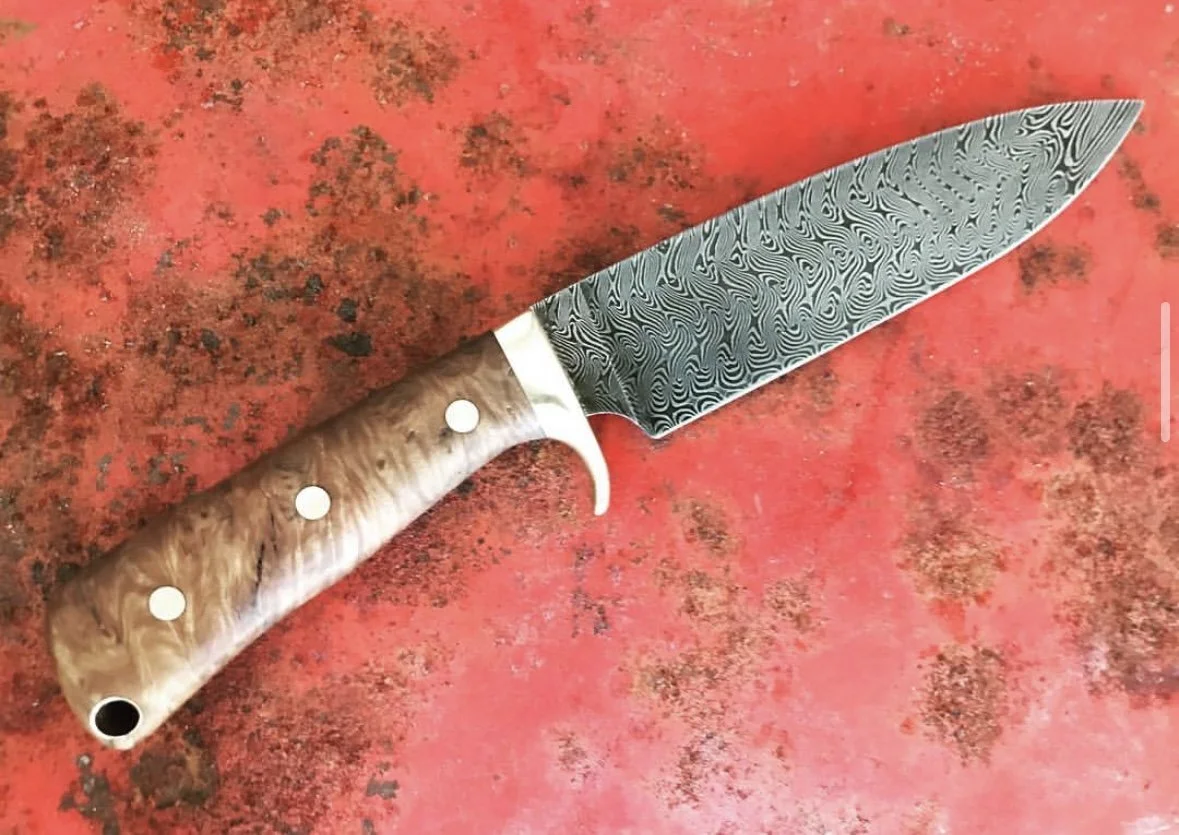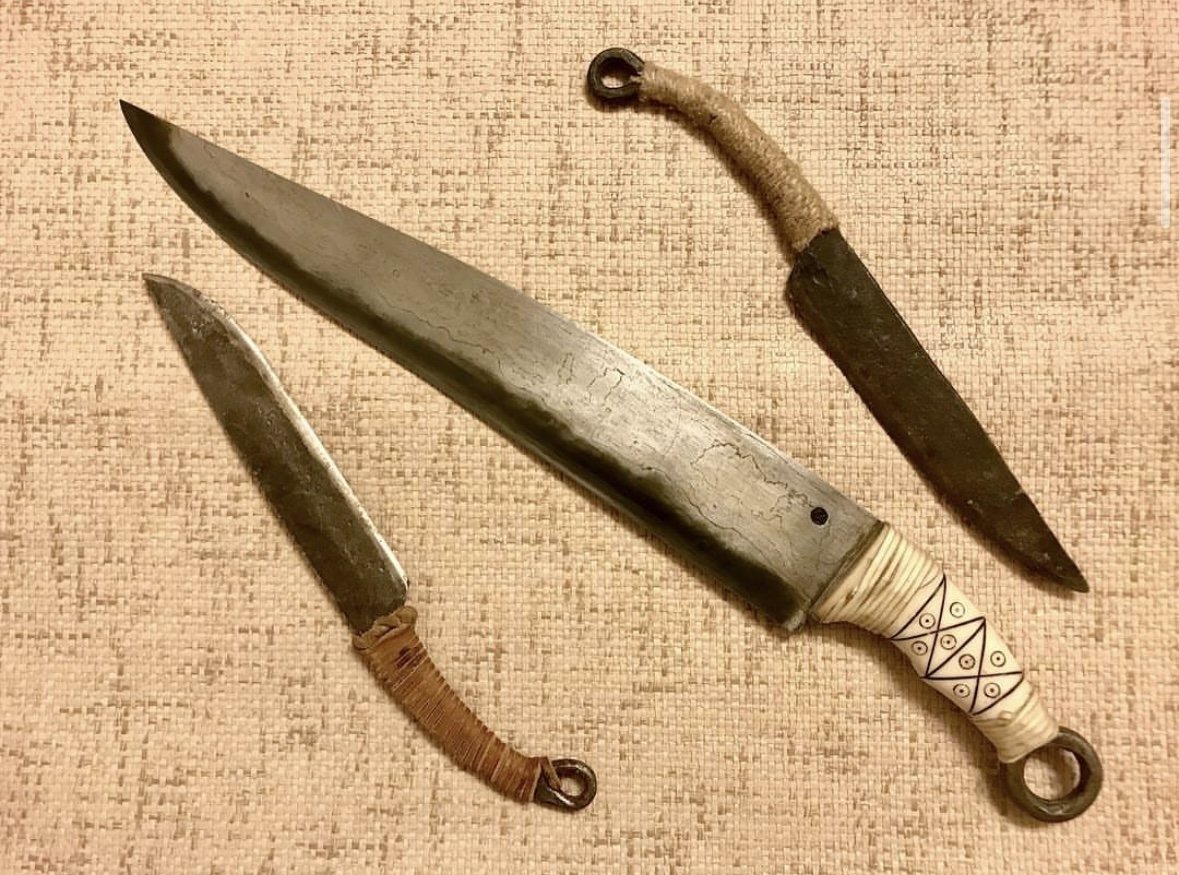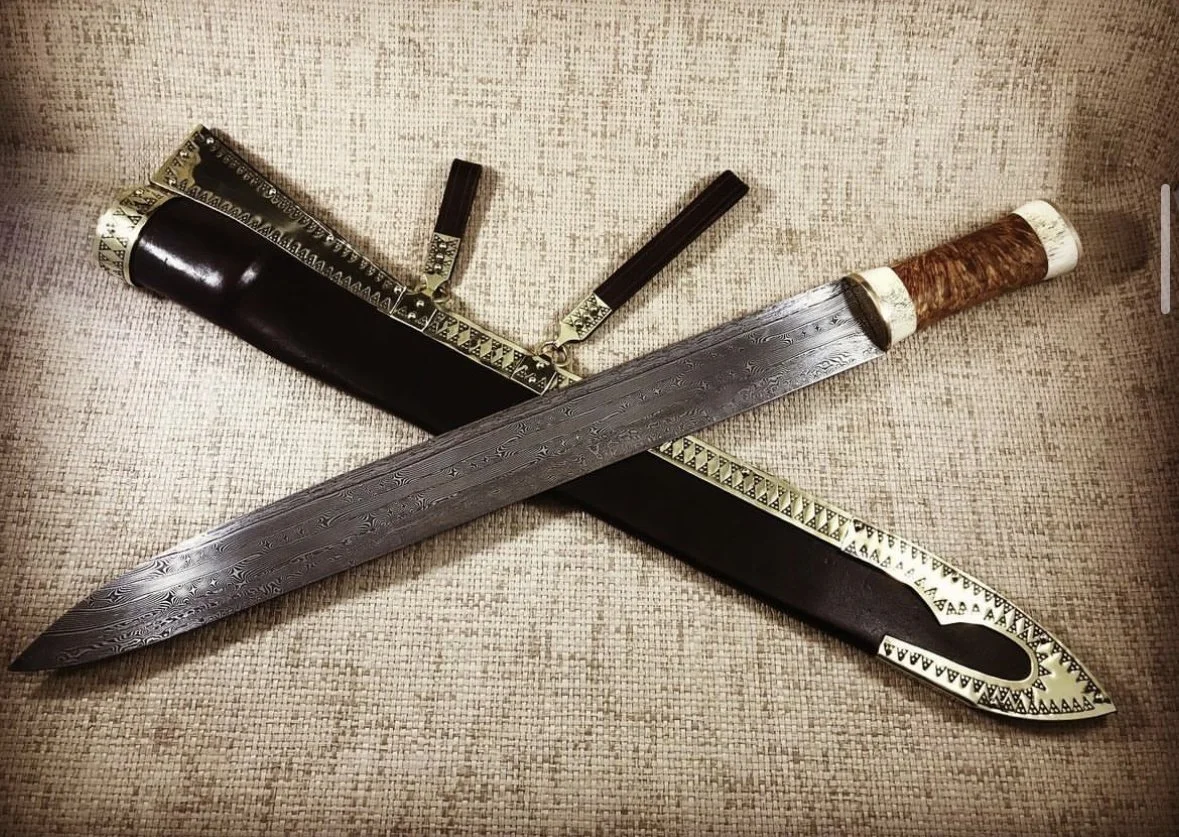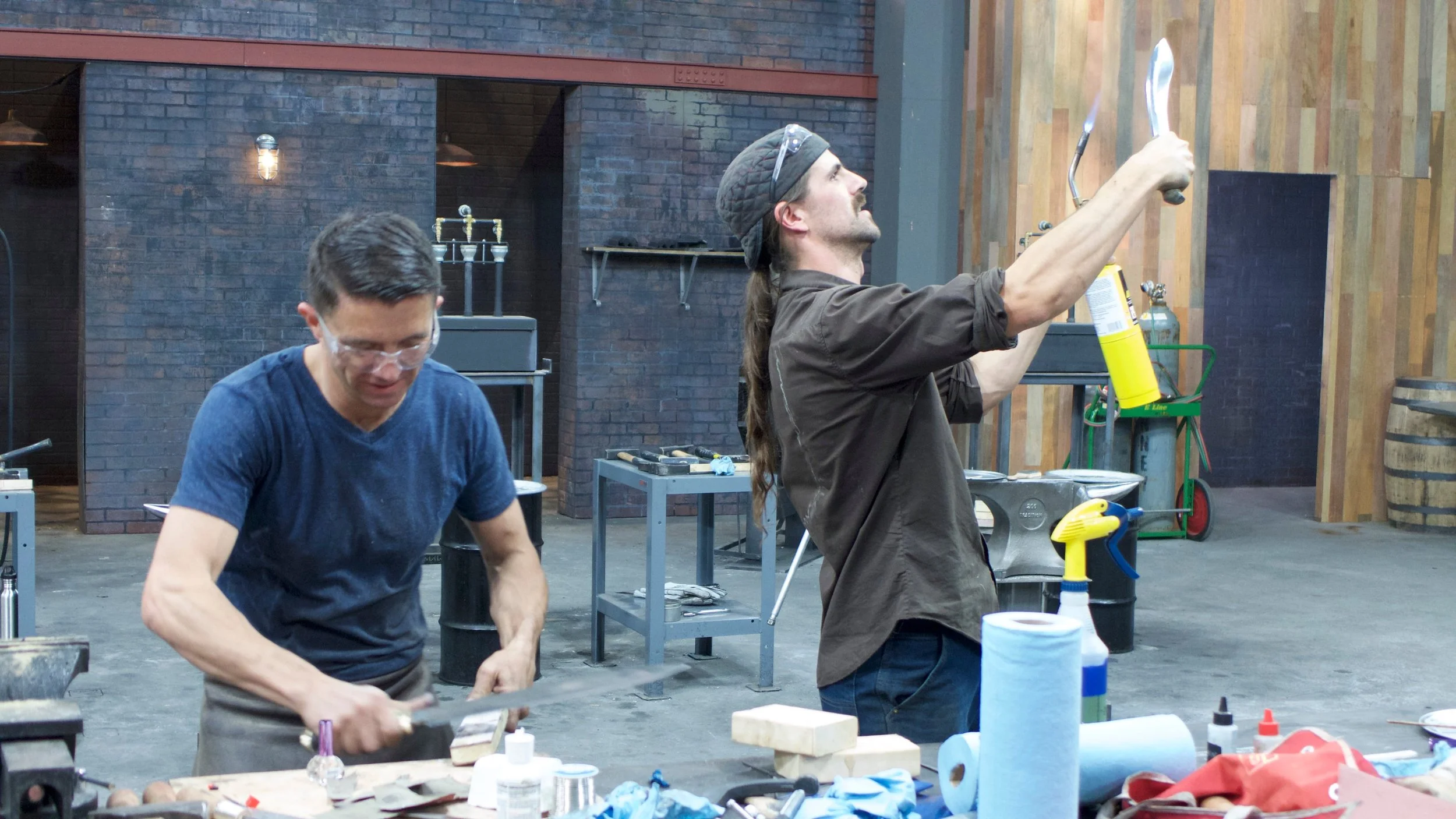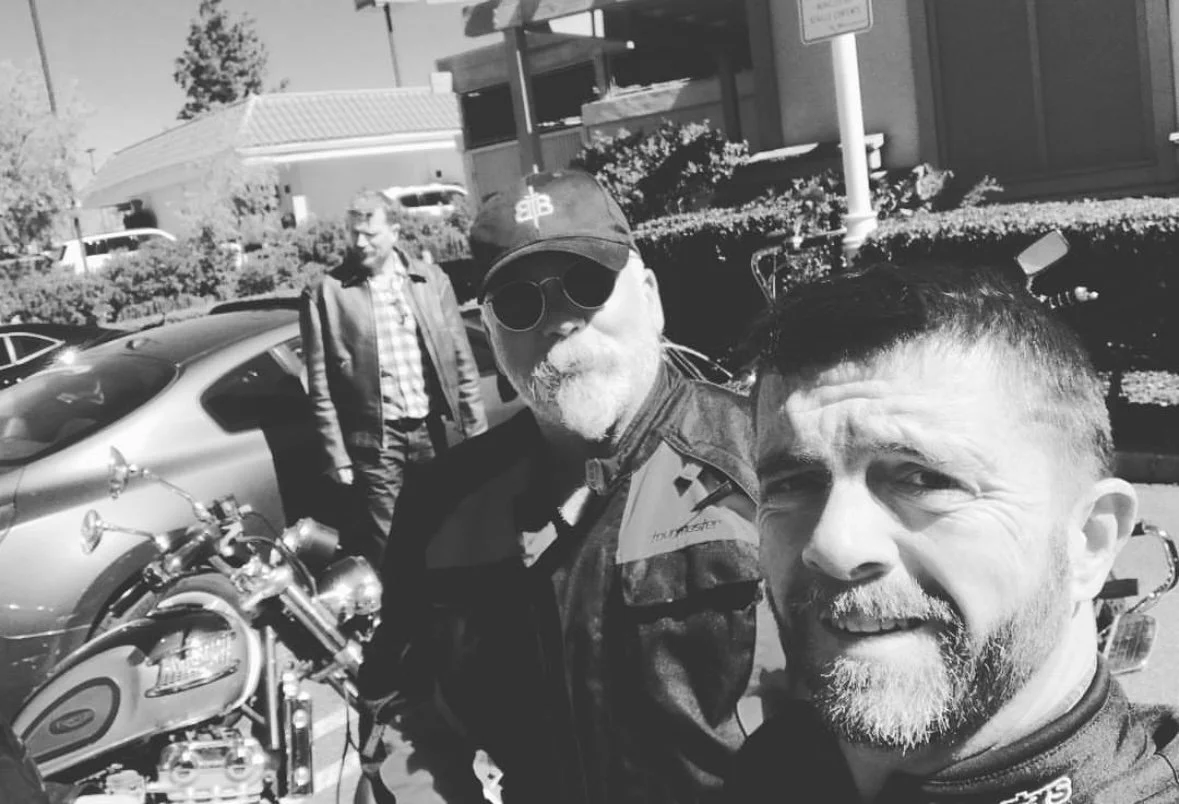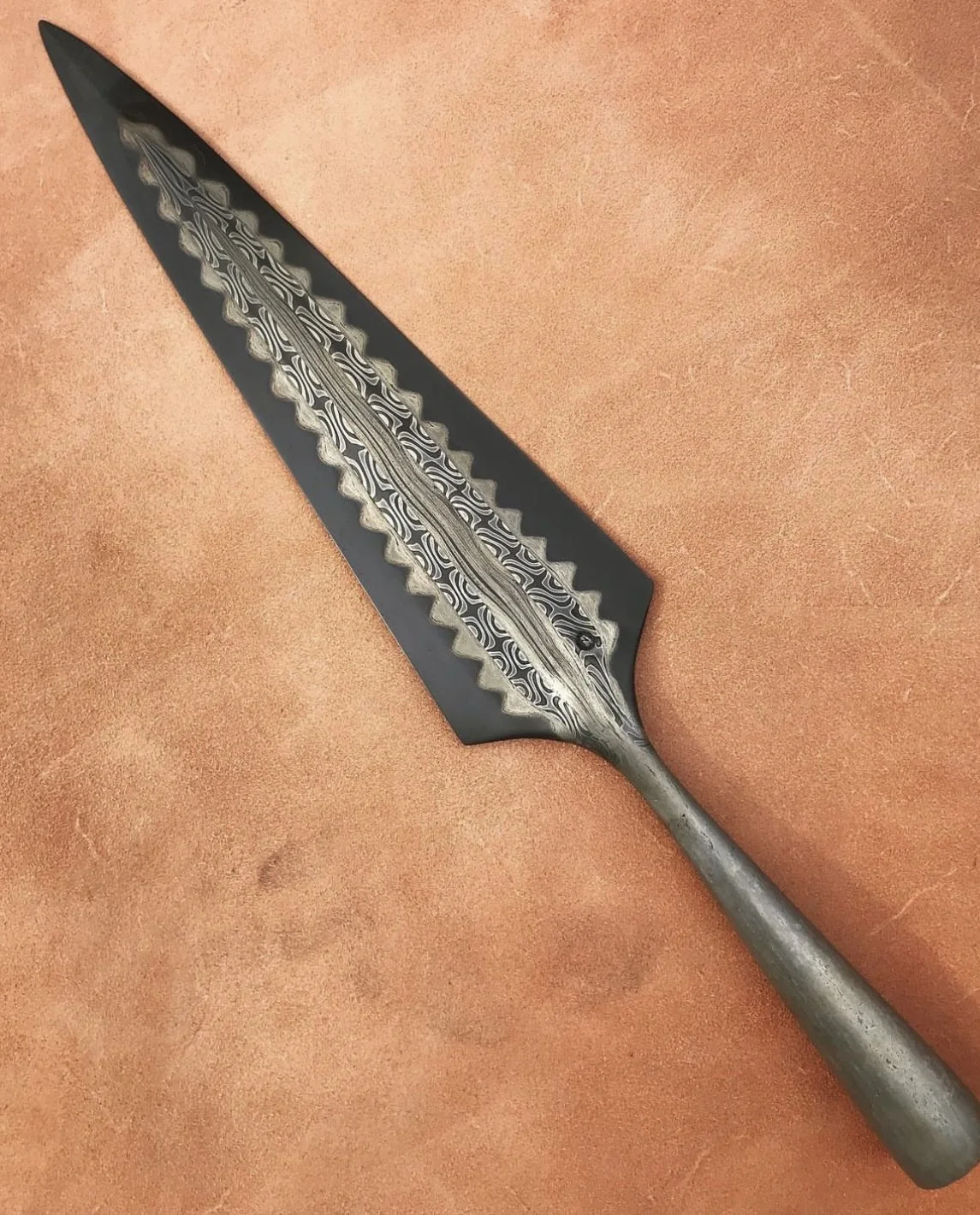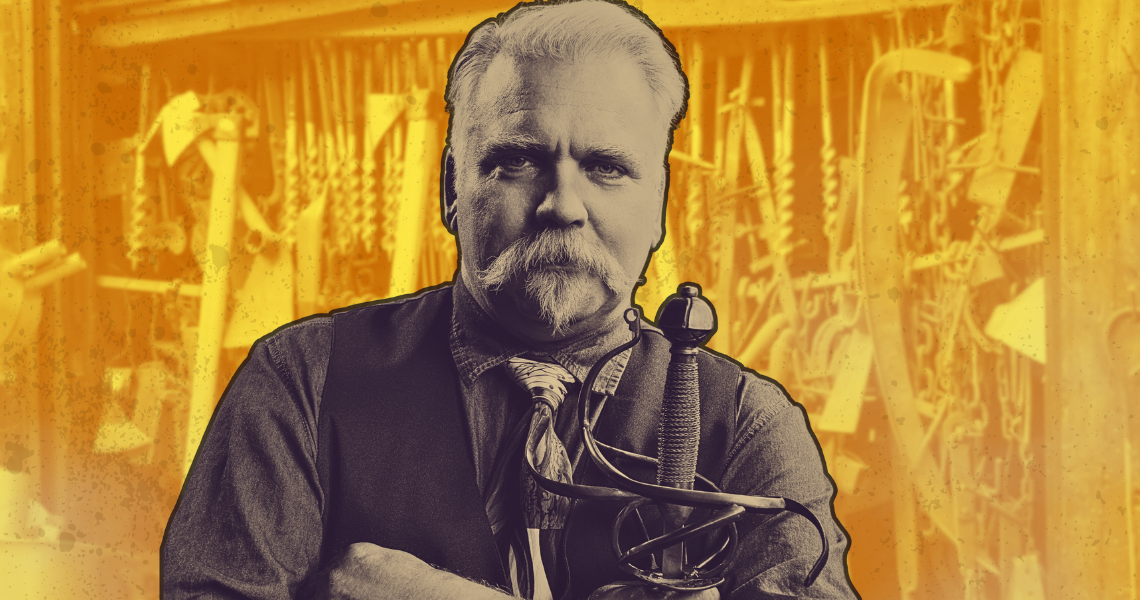A Conversation with Forged In Fire Judge and Undefeated Champion Ben Abbott
Today’s interview is presented by Billet to Blade, the official home of video training from Forged In Fire Judge and Undefeated Champion Ben Abbott. Want to learn bladesmithing straight from one of the industry legends while staying in the comfort of your own home or forge? Check out Ben’s video courses at Billet to Blade.
In season two, Ben Abbott first appeared on Forged in Fire as a contestant, where he won his competition with his recreation of a Khanda. He was then called back in season three to participate in a tournament of champions, which he also won. To his surprise, the next time producers contacted him, it was to offer him a job as a guest judge. Before long, his guest judge spot became a permanent seat. Today, he still enjoys the competition from the judge’s table and occasionally returns to the floor to take on contestants.
RELATED: WHERE TO STREAM AND WATCH FORGED IN FIRE
We were lucky enough to sit down with Ben and discuss his time on the show, what it’s like to be a nine-time Forged in Fire champ, and which he enjoys more—competing or judging.
(Image credit: History)
Ben’s bladesmithing beginnings
BRUTE de FORGE: This is always my first question to bladesmiths- how did you get interested in forging?
Ben Abbot: I have been fascinated with it since I was a little kid. One day, my dad and I had an old metal-working file that we brought out to our outside fireplace, and I stuck the file in the fire. We had this little pretend anvil, which was just a little piece of steel that looked like an anvil, but I took that file out of the fire and hit it a couple of times. Nothing really happened, but I was hooked. I thought that was pretty cool.
Then, a couple of weeks later, I grabbed an old hairdryer, a galvanized steel bucket, and a bunch of Kingsford Charcoal, and I made a real forge with blown air from the hair dryer. The charcoal got super hot, and I put that file in, but this time when I pulled it out, there was only about two-thirds of the file left. I got it so wicked hot that the tip burnt off! But that still didn't faze me. I was still hooked.
I just started banging on stuff. I picked up an anvil for like one hundred dollars at a yard sale when I was about thirteen and started grabbing old leaf springs or whatever I could find and trying to make a sword. Even as a kid, it was what I wanted to do.
I grew up on Long Island, and there's a place called Old Bethpage Village Restoration. They have a blacksmith there, and I would bring my spring, and it would be all cracked and look like hell, but I would ask what I did wrong. He would say, “Well, what did you do?” I would tell him what I did, and he would say, “Well, every part of that is wrong. Let me show you.” And he would talk me through a little bit of it. I ended up going back to that guy and volunteering at that village restoration every Sunday for, like, six months. I would sit there, and he'd show me stuff. But he was not a knife maker. He had no interest in knives and didn't want them to be made in the shop. So, I made hardware, tools and ornamental ironwork mostly, but I learned a lot about hammering, fire control, and blacksmithing skills.
BDF: I’ve talked to several bladesmiths that have mentioned the benefits of learning from blacksmiths before getting into knife making.
BA: Oh yeah. As a judge on the show, I see a lot of smiths that get the steel close to shape with a hammer and then go to the grinder and do the actual work as opposed to really making the knife shape by hand with a hammer and an anvil. So, it does take some skill, knowledge, and training.
Ben’s signature style
BDF: Do you have a signature style that you call yours?
BA: I have a couple of knives that I've made a number of times, and now it's part of my production shape. I call them my EDUs because there's a thing called an EDC, which stands for ‘everyday carry.’ But I actually use mine every day. So, I call it an EDU or ‘everyday use.’ It's just a little shape you can carry legally anywhere—except for courtrooms and places like that. But it falls under the normal knife laws of length and scariness, so it's pretty much accepted everywhere.
(Image credit: Ben Abbott)
I have a pattern that I have developed. I spent four or five iterations of this knife trying to figure out this tiny spot right here [where the blade meets the handle] and how to make that what I want and still look cool. What I wanted was for the blade to come all the way to the back, yet your finger not be in danger of getting cut. I also wanted it to be comfortable. A lot of people will put what's called a choil, where they put this big divot in the blade right here, and it just indicates where to stop sharpening. They might also make a pretend little guard stick out here, but that guard sits high when you're cutting something. So, I did all sorts of hemming and hawing back and forth on this design until I got it just the way I wanted it. But this is one of the designs that I like to use. There is also a drop point hunter, a very simple design, but it has a similar kind of handle and a similar area at the end of the blade.
“I always joke that I’m mad at my guidance counselor because they never told me this career path would be such an opportunity for me.”
So those two are my designs, but other than that, I do all sorts of stuff. Right now, I'm working on a damascus horseman's axe with a blade in the front, a spike in the back, and it has another spike on the top, with these long straps coming down each side. I’m also working on a really unique sword for a video game company. They wanted me to design a sword, make the sword, and then they were going to render it into the game. It’s pretty fantastical, you know, just to fit in with a video game kind of world.
BDF: How did you get involved with that?
BA: They hit me up out of nowhere! People watch the show and see me compete. I always joke that I'm mad at my guidance counselor because they never told me this career path would be such an opportunity for me. Otherwise, I might not have ended up being an engineer for eighteen years.
Ben’s life before Forged In Fire
BDF: Do you miss being an engineer?
BA: I mean, they both have their pros and cons. Engineering was a typical career where you can have a W2 at the end of the year. You know what you're making, you can get bank loans, and everyone understands what's happening. Also, it was a fun project that I worked on and was really challenging and interesting.
I worked at Caltech for eighteen years on a project called LIGO, which stands for Laser Interferometric Gravity-wave Observatory. There are two observatories in America, one in Livingston, Louisiana, and one in Hanford, Washington. They are shaped like Ls. Each of the arms of the L is four kilometers long, and inside is a vacuum tunnel. We put in this laser system and bounced them off these mirrors on the inside. Essentially, what we were looking for was a little bit of motion between the mirrors four kilometers apart, especially one arm with respect to the other. That motion would tell us that a gravitational wave had passed through the Earth from something huge way out in space. Because we had two, we could kind of try and get close to knowing where the source of the object was. There are others now, too. There's one in Germany, one in Japan—probably more by now—and they were looking to put one in India. We think that with enough of them, we can pinpoint the source of the gravitational wave and then have radio observatories swing around and look at it.
I worked on that project from 2000 until 2018. In 2015, we discovered our very first gravitational wave. I was on the project for fifteen years, and some people were on the project for four or five years before I got there. So, for fifteen to twenty years, people were slugging away and making all the electronics, vacuum systems, mechanical spring activities, and whatnot, and nothing happened for fifteen years. Then, all of a sudden, in 2015, we detected something! The people in charge of the project won the Nobel Prize in Physics, which was pretty amazing. The paper that we wrote that discusses this detection had something over a thousand authors. For me, the best part was how they ended up ordering the names on the author list. Usually, a scientific paper would perhaps have the lead author (who would have been the lead researcher), the second author, and the rest listed as ‘et al.” But, because it was hard to determine whose contribution was more important, they did the whole paper alphabetically. So, the contracted author list is listed as “B.P. Abbott et al.”
BDF: It must have been an amazing feeling to be involved in that for that long, put so much work into it, and finally be there to witness the fruits of your labor.
BA: Yes, if I had left the year before, I would have been so mad. So, there was that awesome part of my engineering career. Also, I got to work with my brother every day. He was there before I started. He is a phenomenal electronics engineer, and I got to help him and work on the team. It was fun to be that close to my brother for eighteen years.
But now I'm my own boss! I do whatever I want!
BDF: Do you find that your engineering background has helped you with your bladesmithing? Do the skills transfer?
BA: Oh, 100%. Especially because of the project I was on. We weren't pigeonholed by our discipline on that project. I was doing electrical engineering, but I was also helping with mechanical and optical stuff. So, my hobby of metallurgical studies translated well into engineering. I would be at big meetings where people would have these big springs that were doing things, and I was able to offer insightful comments and questions on the kind of metal they were using for the springs and what kind of temper they were doing. I learned and also gave some input as well. So yeah, it translated very well.
“My hobby of metallurgical studies translated well into engineering.”
But, in a broader sense, being an engineer is being a problem solver. You have to understand how to troubleshoot a problem. For example, if I'm running a sprinkler in my backyard and the water is at point A but not at point B, I have to figure out what is in between those two things that could be the problem. It’s that kind of thing; you narrow the problem down until you know where the issue is. Even when I'm competing on the show, being able to problem solve and think ahead enough to say, “Here are the pitfalls that I might see. If I see A and B, I'm not going to try C.” That whole mentality has really helped. It has everyday applications that I could not have foreseen.
How Ben joined Forged In Fire
BDF: How did you get on Forged In Fire? You were a contestant first, so let’s start there. Did you apply, or did they find you?
(Image credit: Ben Abbott)
BA: Well, I watched all of season one, and I was excited about it. I thought it was a great show. I really respected the judges because I would be watching, and I would see something—a little glint on the closeup—and think, ‘there's no way they're going to catch that.’ But, sure as heck, they always caught it, and they would point it out. They were really good, always fair, and knew what they were talking about. I got the feeling that they were trying to make a show that portrayed this art form in a great way.
So, I watched season one, and I was excited about it. My wife at the time said, “Hey, you should be on this show.” I said, “There are so many better knifemakers out there than me. I'm just an engineer that does this as a hobby.” Her reply was, “Well, every time you go into the garage, you are rushing around and don't get much time to make a knife. You're always running and trying to be fast.” But I didn’t think much of it. Then, I was teaching at a local blacksmithing shop in L.A. called Adams Forge, and one of the people who ran the shop sent an email to all the instructors and said, “Hey, they're having a casting call for Forged In Fire. You should put in your applications and see what happens.” I went to the website, and they asked for a description and a picture of some work. They also asked for a picture of your workshop to prove that you didn’t use photoshop.
“I got the feeling that they were trying to make a show that portrayed this art form in a great way.”
I sent in my stuff, and a few days later, I got a phone call from one of the producers. Then they wanted to do a Zoom call, so I went home, and I got my computer set up. I have a friend who is a director of photography, and I asked him, “How do I make it look cool?” He told me where to put a light and to put a T-shirt over it. I did all that, and we had the meeting, and it went well. Then I got a call a week later that I would be on a TV show!
They flew me out to Brooklyn, and it was all crazy. I was so excited. It was mid to late December 2015, I think. It was like a once-in-a-lifetime opportunity to be on a TV show. I got to the hotel, and my nerves were killing me. I decided to go out and find a pub to have a quick pint before I went to bed. I found a place close to the hotel, and as I'm sitting at the bar, I hear these two guys at the other end of the bar talking about grinders and throwing out smithing jargon. I looked over and said, “Hey, are you guys here to compete on that show?” And they were! We sat there, and the three of us chatted and had a great evening. Then we woke up the next morning and went to compete.
(Image credit: Ben Abbott)
As I walked into the studio, it was the craziest, most surreal thing because you've only seen the set on TV. Now I was walking in and seeing it in person. When the clock started, I focused on making the best blade possible. I did a little extra to go above and beyond; I did a forge weld, and nobody else did. I hoped it would raise the game a little bit for me. But honestly, at that point, I had made knives, but only a few. Probably only around twenty blades or something like that. Which is more than most people as a hobbyist or amateurs make. I usually did swords and museum reproductions with pictures, so I didn't know the steps to create a standard American ABS-style knife. I just did the best I could. I ended up winning, of course, but I was more comfortable making the sword than the knife because the sword was a historical reproduction. I could look at pictures and make that happen.
BDF: That was your first of nine wins. You are still undefeated on the Forged In Fire floor. Are you starting to feel unstoppable?
BA: (laughing) Never. I get nervous every time.
There is a fellow who has won eight now, I believe. He's done more of the tournament style. He's good, and he’s competent. He’s also an engineering student.
BDF: You seemed so calm and collected on your first episode. I would not have guessed that you had only forged a few knives.
(Image credit: History)
BA: That has always been the issue for me. You asked earlier about my signature style. I still don't have a signature style in my mind. So, whenever they say to me, “Make a knife in your signature style,” I'm like, what would that be?
The second time I was on the show, we had a complex challenge to use san mai. I was like, ‘How do I make it? What kind of knife am I making? Where do I start the handle? Where do I stop the blade? What kind of point am I putting on this thing?’ All of these thoughts were racing through my head, and I kind of forgot how to make a knife. I was up against these guys who do this every day, and, at the time, I was still a weekend warrior. It was a panic moment! It was not an amazing blade by any stretch, but it was only five hours of work.
Behind-the-scenes moments
BDF: Were there any behind-the-scenes moments that surprised you your first time on set?
BA: Actually, something I still find funny is that contestants are on the set for a while before they start shooting so that they can see what's going on. They don't see the challenges or any of that kind of stuff, but they get to see the set. Production shows everyone where all the tools are and how to use them, how to turn them on and that kind of stuff. But they ask you, when you walk out on the floor for the competition, to walk in and look around like you've never seen the place before. So, if you watch, some people are cool and nonchalant about it, and some take the acting direction very seriously. Watching how people choose to act in that moment is one of my favorite parts of the show.
BDF: Did you ever imagine walking out onto the set the first time that one day you would be a judge for the show?
BA: No. No, I did not think that at all. Even the second time, it wasn’t in my wildest thoughts.
From contestant to judge
BDF: How did you end up becoming a judge?
BA: While I was on vacation in Belgium, I got a phone call from the producer at the time, Paul. He said, “Hey, J. Nielson needs some time off. Would you be able to come in and do a guest spot as a judge?” They needed me to go in for five or six episodes. I didn't know how I was going to make it work because it was a long time to take off work, but I immediately responded, “Hell yeah! Let me check with work and see what I can do.” I had a certain amount of vacation days saved up, so I told my employer I would take them all in a row and that I would work from the studio to keep up with work. So, every time we were in between shots, I'd be sitting there in the judge's area at the table on my computer designing electric circuits. It was all really fun.
Then, Paul came back to me one day and said, “Hey, we need you to stay longer because we just got a new order from the network, and they want more shows. Can you stay?” I wasn’t sure, so I called work and explained that the network asked me to stay longer. I told them I would take time without pay or work a couple of hours a day. Human Resources came back, and they were hesitant. At Cal Tech, as long as you were doing your work, no one was at the door counting your hours. We didn't have a punch clock. As long as you were getting your stuff accomplished, your hours were pretty fluid. But they were never this fluid.
It ended up that I did stay for the next couple of episodes. In the meantime, my marriage was kind of on the rocks and ultimately ended in divorce. Right around that time, Forged In Fire called again and said, “Hey, we want you to come back and be a full-time judge for at least half the time, maybe more, depending on what J. wants to work and what he can work.” So, I'm sitting in Pasadena, living in my brother's house, worried that anytime I go out, I'm going to run into my ex-wife. I had always wanted to move back to the East Coast and get back to the Richmond area. I asked for any sign that it was time for me to move to the East Coast. For one, I was getting a divorce. Two, they wanted me to film this show as a full-time judge. We had found gravity waves at Caltech so I felt accomplished there. Finally, I said, “I'm ready to go.”
I grabbed my dog, and we flew out. They put us up in this hotel near the studio in Stanford, Connecticut, and I lived there for a couple of weeks. Then, they moved me into a corporate apartment, and I lived there for a while.
But what's crazy is I landed at Stanford in May, and I had been separated for a short time, and a good friend of mine called me up, and he's like, “Hey, this girl that I'm friends with, and I have the perfect woman for you. We think that you guys would hit it off. You guys are both amazing…but she lives back in L.A.” I had just left L.A., never to return. Anyway, they told Heather to call me, so on my second day in Stanford, I got this phone call from her. We chatted that day for hours, and it was wonderful. Two weeks later, I was flying back to L.A. to visit her. It was crazy, but it was great. Now, Heather and I are married and have a two-year-old boy!
BDF: Sometimes things work out.
BA: Yes, things do!
Competitor or judge?
BDF: Having been a competitor and a judge, which do you prefer?
BA: We did a series called “Beat the Judges”, and each of us judges did two competitions; J. did two, Dave did two, and I did two. That was fun! Stressful but fun. Then, they did a five-episode arc titled “Beat the Unbeaten”, and I did those. I competed once a week for five weeks. It was a stressful time, but making it was fun. It's still exciting and exhilarating. Winning is fantastic, but it's still very stressful.
Judging is super easy. You sit at a table and watch your favorite TV show live. Then you use your expertise and help people understand what's going on, and we use our knowledge and sense of fairness to render a decision. So, it's a lot easier to be a judge. Plus, it's Monday through Friday.
I don't know which one I like better. But, if I had to do just one thing for the next 15 years, I probably would choose to judge because it would get exhausting and old to compete all the time.
“Judging is super easy. You sit at a table and watch your favorite TV show live. Then you use your expertise and help people understand what’s going on.”
J. and I now split the shows fifty-fifty. I did all of the rest of the season when I started. Then the following season, I did, like, seventy-five percent. Now we're just splitting them evenly. We get paid by the show. Baker, Doug, and Grady get twice as many episodes, but I hear them complaining that they don't have any time off and can't do any of the projects they want to do. I've got half my time off, and I get to come home and make stuff. I make decent money by making blades. We are looking to buy a house, and I will be able to work on it and get it to where we want to be, and nobody cares. The freedom that comes with the fifty-fifty split is amazing!
BDF: It sounds like you still enjoy the show, then.
BA: I really do, yes. As a side note, I still think that it is strange that I get recognized several times a week. It’s odd. Even during the pandemic's peak, with a mask on and just my eyes showing, people would recognize me. For me, it's always fun because some people know me but don't know where they know me from. They usually put it together pretty quickly. It's funny.
Our fan base is very respectful and very nice. They will ask for a selfie, or I'll offer a selfie with no problem. I'll be having dinner, and they will walk by quickly and then run away like they’re trying to confirm it’s me. They're very respectful people.
RELATED: A CONVERSATION WITH FORGED IN FIRE JUDGE DAVID BAKER
One thing that I found fascinating is that some people will really fangirl when they meet us. It’s crazy. I'm just a dude. I think that's kind of what makes me, Baker, Doug, J., and Grady more approachable to people. It’s that we are ordinary people. We are not overpaid, and we're not living a Hollywood lifestyle. We drive our own cars to work. I’m still “Jenny from the block”.
“I’m just a dude. I think that’s kind of what makes me, Baker, Doug, J., and Grady more approachable to people. It’s that we are ordinary people.”
BDF: I think the fact that you are all down-to-earth people eases the minds of the contestants coming on the show. They know that they will be judged from a fair perspective and not laughed at for any mistakes.
BA: Yes, absolutely. The thing I get a lot is when contestants think they're doing well, or if they win a couple in a row, they’ll look up and be like, “I'm coming for your job, Ben!” I always say, “Come for their [the other judges'] job! Come for Baker's job or Doug’s job! I'm already splitting this job. Get your own job!”
But they feel like they can talk to us and joke with us. They see my story as something attainable. On the first show that I judged, Doug turned to me and asked, “How does it feel to be up here?” I said, “It's like I used to be a gladiator, but now I'm sitting up here with the emperors.”
Ben’s future on the show
BDF: Will you continue to be on the show as long as they ask you?
BA: Oh, 100%. Yeah, I won't quit. The crew has always been outstanding. The judges and the new host, we all work well together. All five of us get along so well. Even before, when J. and I were competing for shows—I didn't realize it at the time, but we were in competition to keep our jobs—we were, and still are, friends.
“On the first show that I judged, Doug turned to me and asked, “How does it feel to be up here?” I said, “It’s like I used to be a gladiator, but now I’m sitting up here with the emperors.”
David Baker and I are close. He actually bought the farm right next to the one I own. I rent mine to a family, but he lives at his. I go down there all the time to visit Dave and see my tenants, and then we’ll stay at Baker's and hang out all day. We even recently had our wedding at his farm, and Dave was our officiant.
(Image credit: Ben Abbott)
The freedom of forging
BDF: Beyond the fact that it has brought you into this incredible show and wonderful job, what do you enjoy most about forging?
BA: There's a lot. Forging, in general, is fun because it is it enables you to make essentially anything you want. Somebody can give you a lump of steel or iron or whatever, and they could say they want a pair of pliers, and I can do that! No problem. If it's iron and has no carbon but needs to be a knife, I can put carbon in it. I can make a knife out of it.
It's so interesting, the things you can do with forging. Even in a broader sense, I do a lot of other kinds of metalwork. I do silver work. I do precious jewelry with gold and platinum. In any of that, you learn that you can take a blob of something and turn it into a thing. Pliers, hammers, and whatever I need for a job I'll make, and it's just freeing and liberating. That aspect makes you feel powerful in a way. It's awesome.
(Image credit: Ben Abbott)
I like its permanence as well. I don't blow glass because you can drop it, and it breaks. But a piece of ironwork or bronze lasts for thousands of years. It will last for several generations if taken care of. You can have a knife that continues to work perfectly well for years.
The other thing I love is making things for people. Specifically, when they see it for the first time. The joy that it brings. I have one client who buys a gift for her husband from me every year. I consider her a patron of the arts. She will send me an email and write something like, “Hey, it's that time again! What do you want to make?” And I'll write, “Well, I've always wanted to make this thing,” and she says go for it. No more questions asked. This year I made a Viking Spear with some techniques that I had never done before. The best part was that I was posting it on Instagram as I went, and he was following me. He watched and salivated over it, and when Christmas came, he got it. He was shocked!
“I like its permanence as well. I don’t blow glass because you can drop it, and it breaks. But a piece of ironwork or bronze lasts for thousands of years.”
I've also made friends from every aspect of this trade. It's a great community. There’s just a new mindset amongst makers. You know the saying, “a rising tide lifts all boats?” That’s kind of what it is. I have no secrets. If you want to call me up and ask how to do something, I'll tell you. I'll still keep my clients, and I'll still make my Viking Spears. People love doing this stuff. There are many reenactors out there. A lot of people grew up playing Dungeons and Dragons in the basement, and now they're CEOs of companies, and they want a sword! So, I’ll make them their sword.
It's just fun, and it's a bunch of great people. You see on the show often where one competitor will help another competitor and tell them why something is not working. I'll answer questions in real time when I compete down on the floor. I always think that if the answer to my question is enough to help them beat me, they deserve to win because they could have looked that up later. Nobody minds sharing. Nobody is working behind their little curtain. It's a fantastic community, and it shows all the time. I really applaud the show for showcasing the camaraderie and the character, not the discord, which is popular in a lot of reality television.
Can Ben forge the Last Blade Standing?
BDF: Speaking of the community beyond Forged In Fire, you are a competitor in Last Blade Standing this season. How did you come to be a part of that?
BA: I had heard about Last Blade Standing, and I was talking to one of the guys on it, and I told them I wanted to do it. That's all I had to do, was say I wanted to do it. I didn't know much about it. I knew that this was a competition where you send in a blade, and then they test it and declare a winner, but I didn't know what happened to your blade after it was all over. It turns out they auction it off for charity after the show. They do some testing in Florida, and the finale is in Salisbury, NC. David Baker is going to fly down and be one of the judges, which is neat. But I didn't know how much effort to put into this sword. Then I started doing some research and realized that people are bringing their A-game to this thing. So, I ended up spending a lot of time on it. But it's cool, and I got to do some fun new things. I made a big nickel silver guard for it. Twisted crushed W’s san-mai over an 80CrV2 core.
RELATED: LAST BLADE STANDING TAKES A SEAT FOR NO MAN!
BDF: I've talked to a few contestants that are hoping for the opportunity to go up against you.
BA: I think the biggest thing that gives me an advantage is having tested so many swords. I know how much of it comes down to the ergonomics of a handle. So, I spent a lot of time making that handle just right and then got into edge geometry. The thing I'm most worried about is that if they test on the barrel standing up, they're going to cut into the rim and the edge band, which is a ring of iron. I wanted to make sure that my steel was tough enough for the edge not to get too damaged and fine enough to bend and cut through pool noodles. Having judged a lot of weapons like that and made a lot of weapons to do that kind of thing, I think I'm okay. My biggest worry is that the handle is going to come loose.
Ben Abbott’s advice
BDF: Do you have any advice for aspiring bladesmiths?
BA: My biggest advice is to learn and understand the science of metallurgy. Anyone can grind something and make it look like a knife, but if it doesn't hold an edge, then it's useless. Learning metallurgy is the number one thing.
If you hope to be on the show one day, learn how to multitask! It’s not just about what’s tried and true or how fast you can do it.
BDF: Thank you, Ben, for taking the time to talk to us. We appreciate it, and we will be watching how you fair on Last Blade Standing.
BA: Thank you for reaching out. This was great!
To see more from Ben Abbott, you can follow him on Instagram @abbott_ben, and on Facebook. Ben’s website is ashgroveforge.com and you can pick up his online training courses at Billet to Blade. Of course, you can also see him on Forged in Fire and on season three of Last Blade Standing.
TRENDING
About The Author
More Interviews



